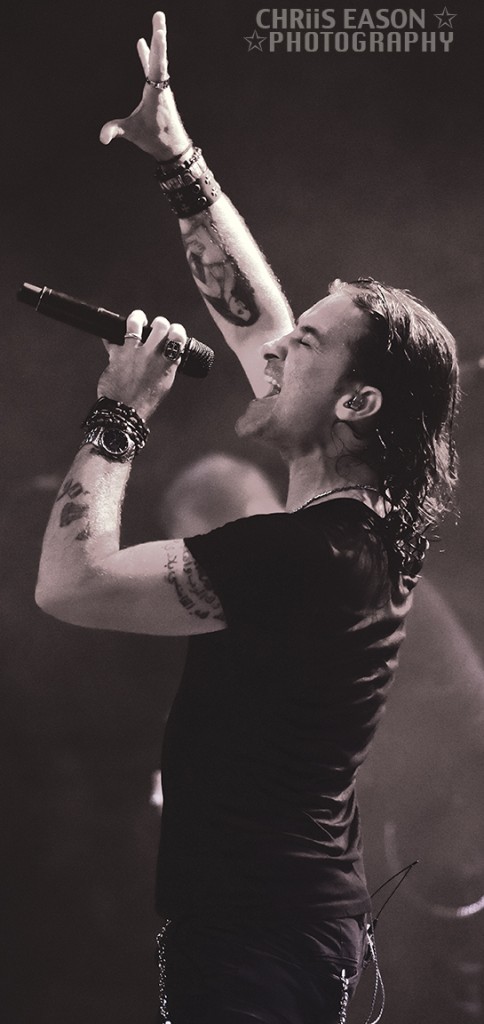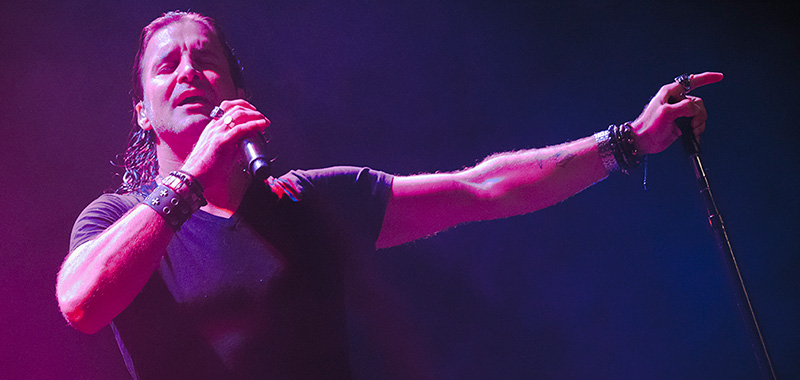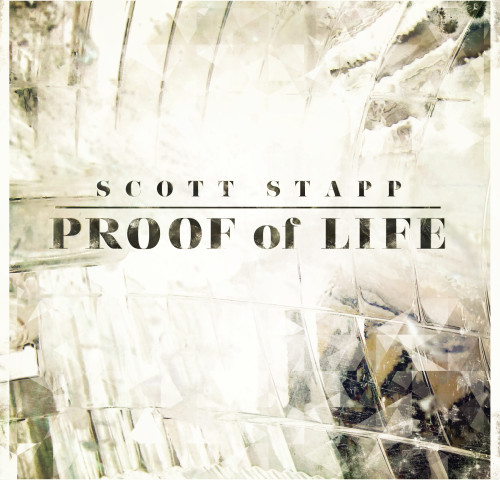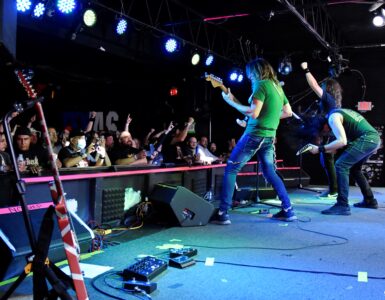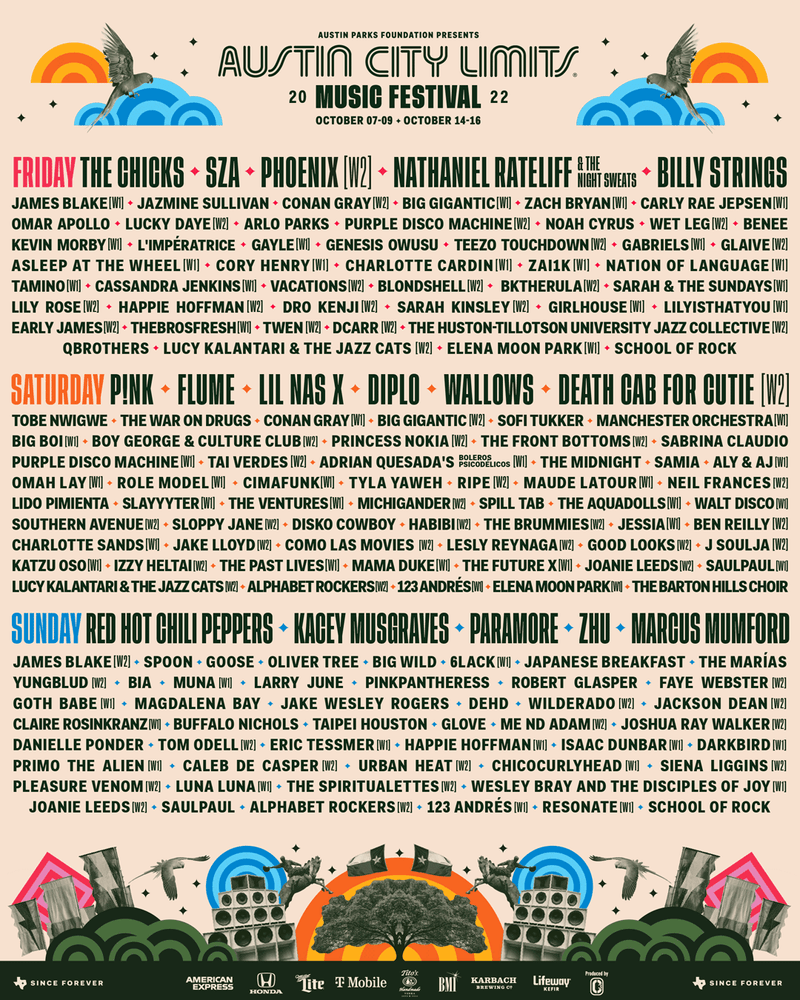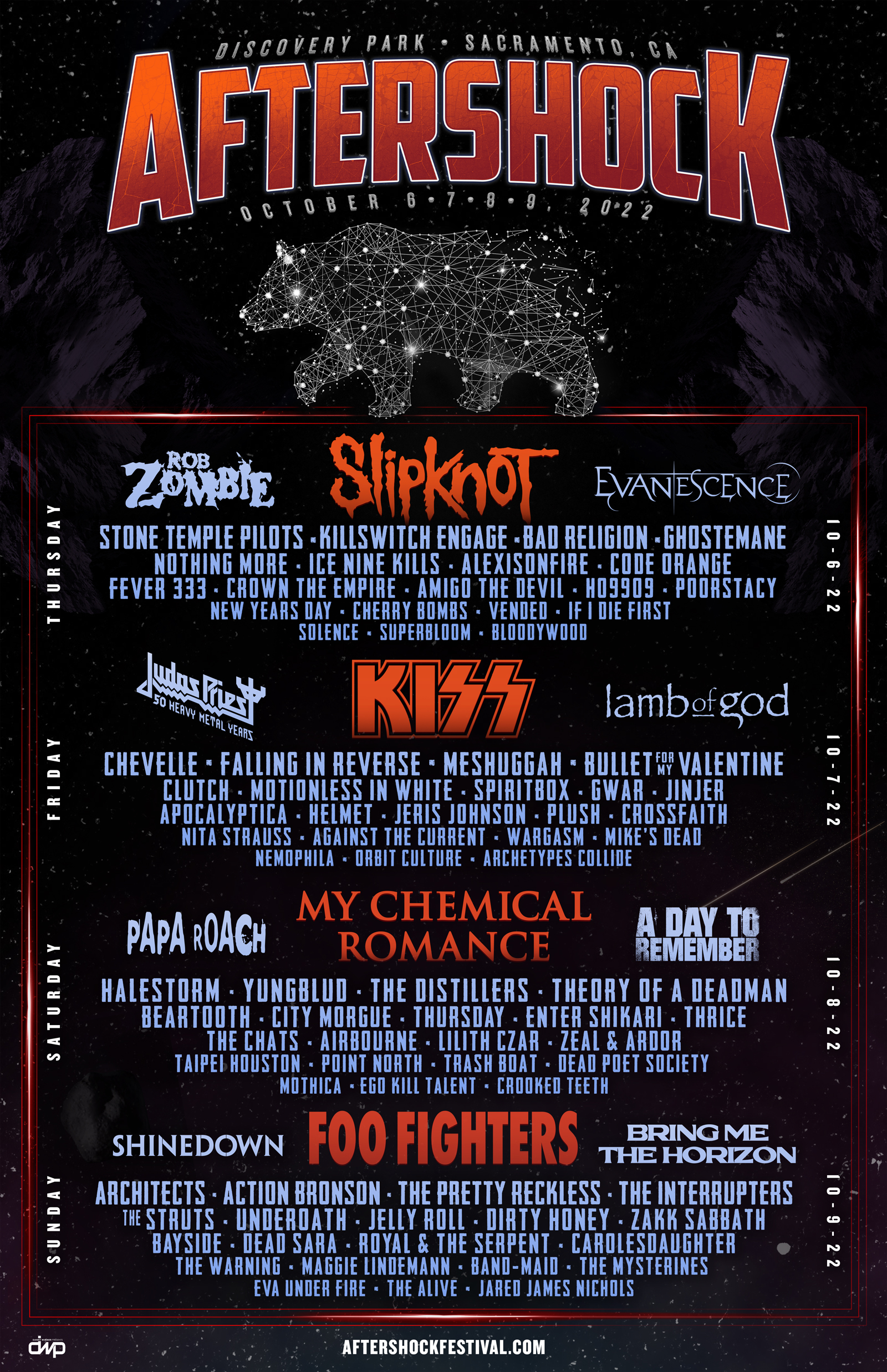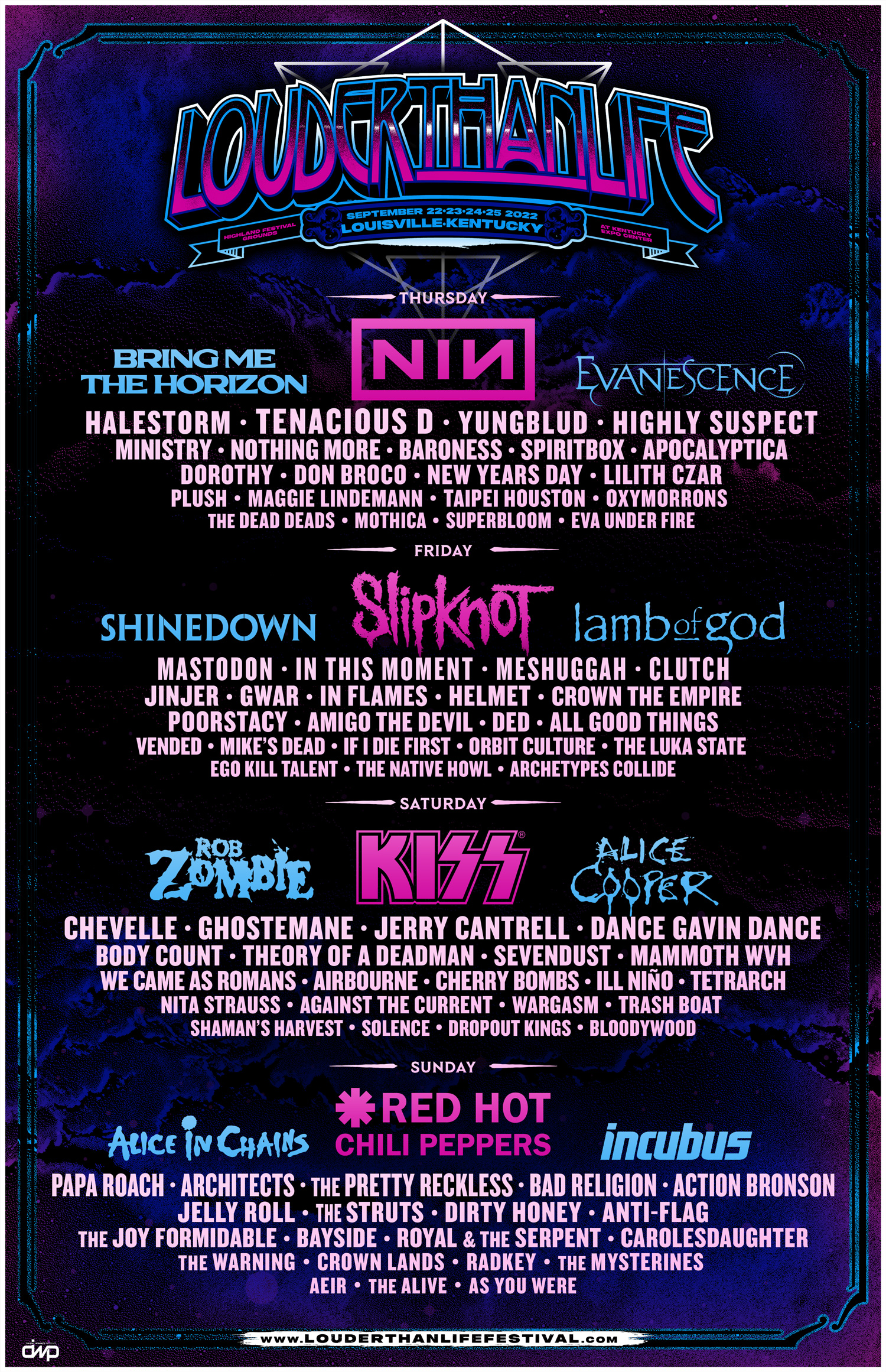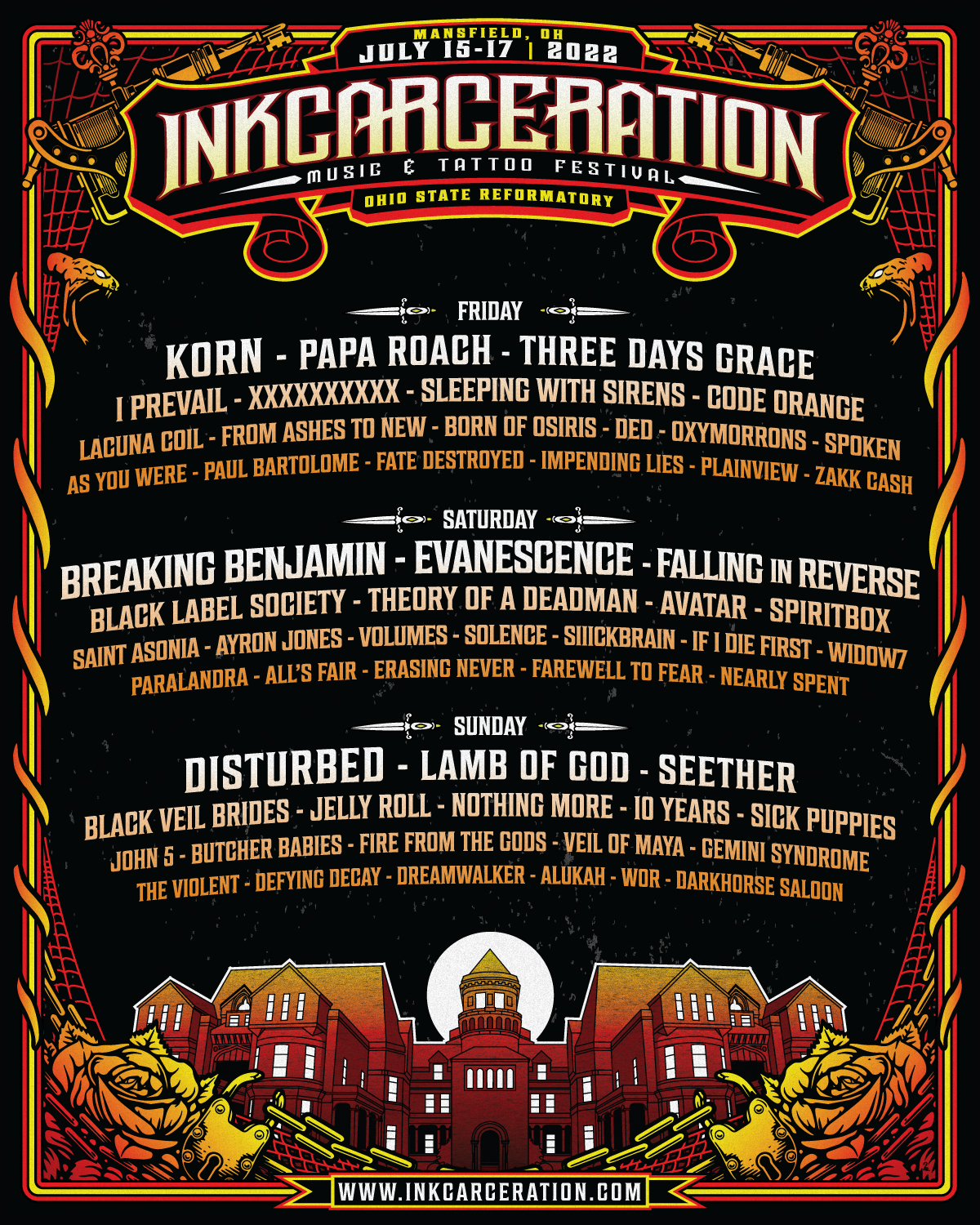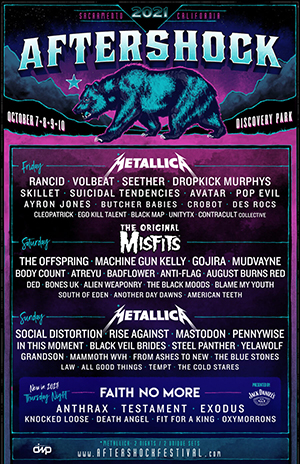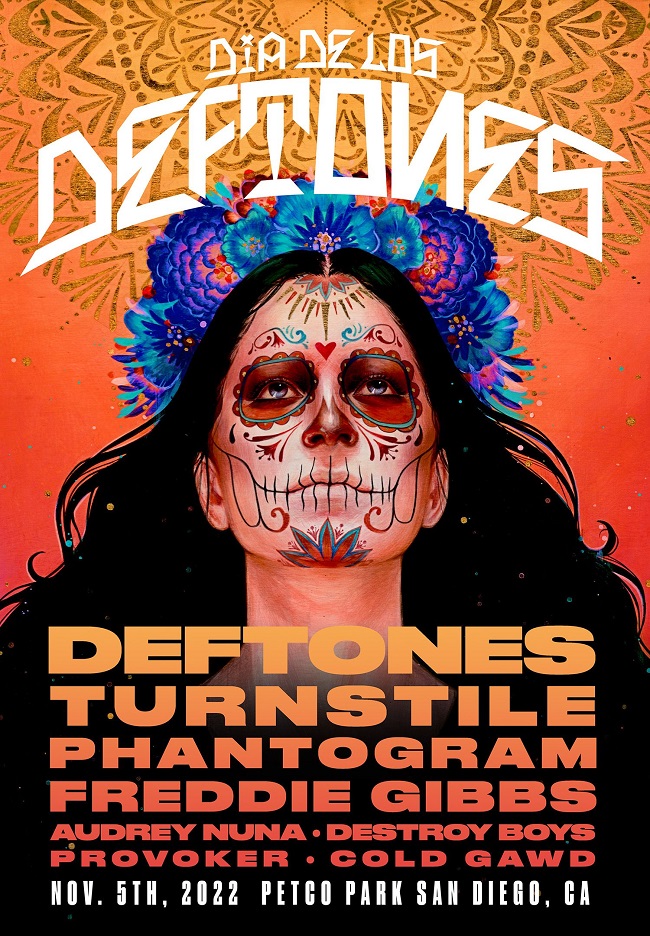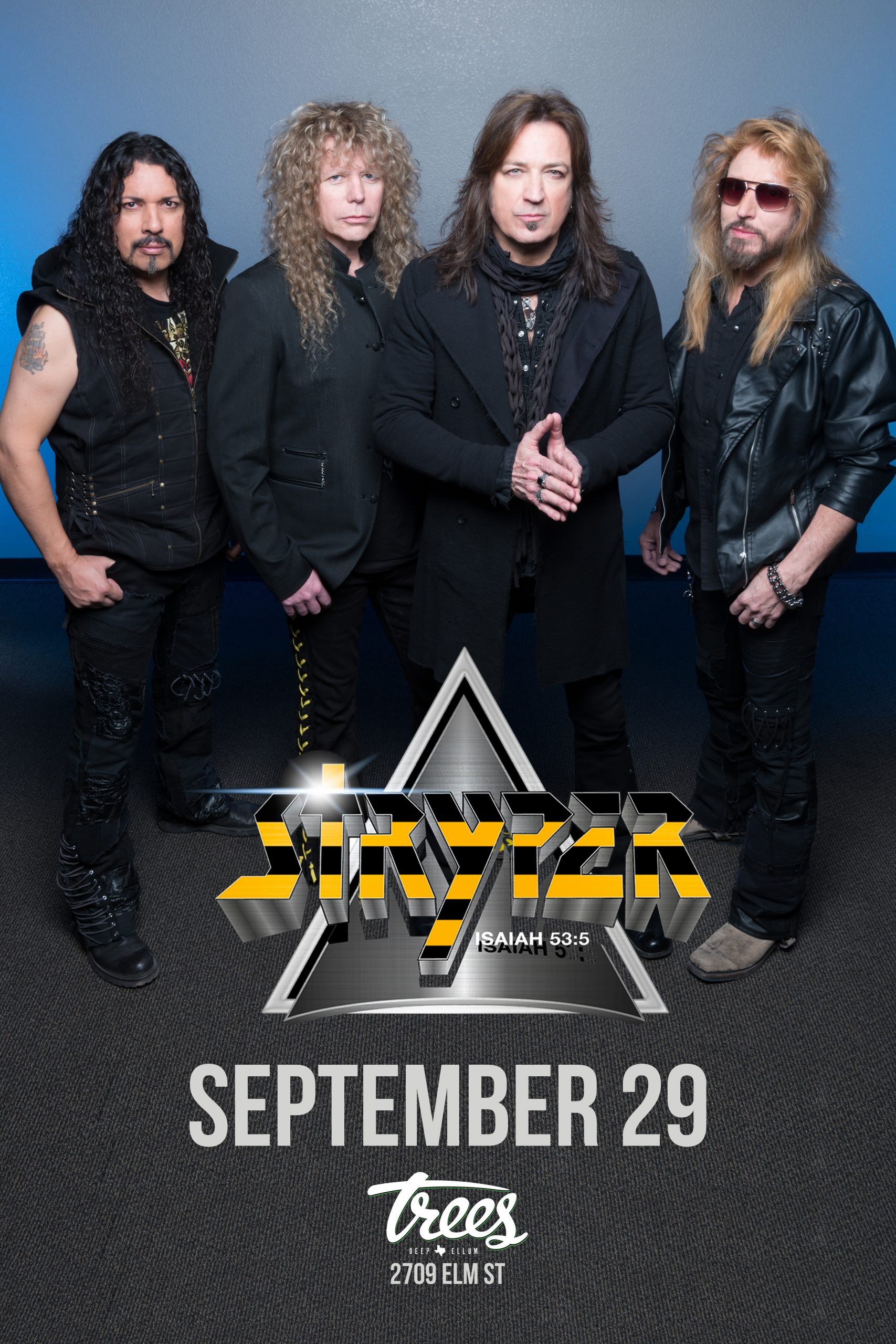– Interview by On Tour Monthly –
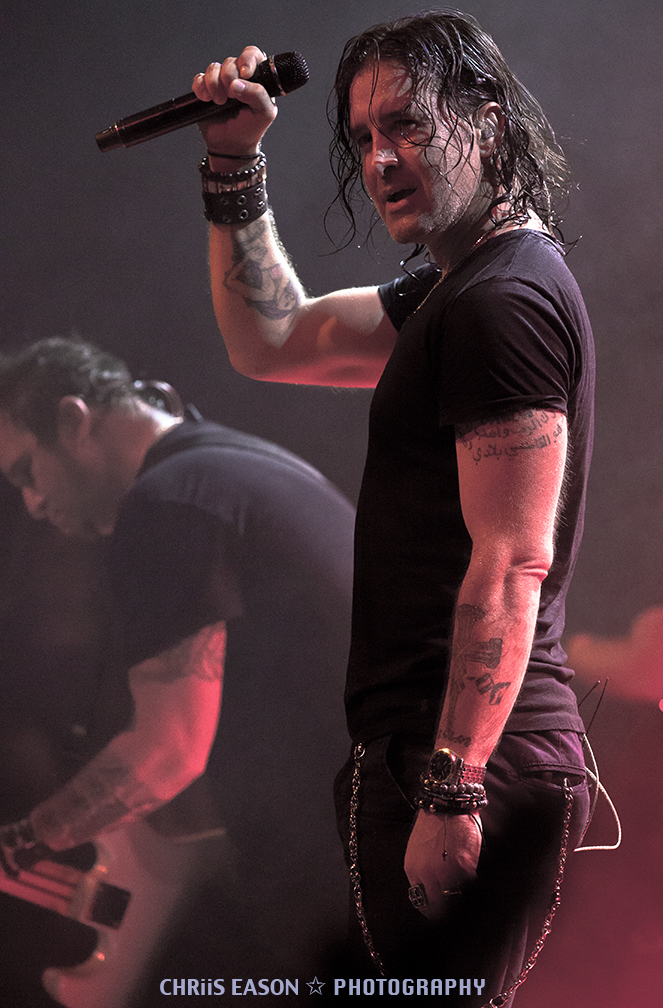
Don’t Cry Victim To Me.
It’s the name singer Scott Stapp should have called his autobiography instead of Sinner’s Creed.
The wheel has certainly turned 360 degrees for the former lead singer of the Florida rock band that literally ruled the airwaves from 1997 thru 2001. During an amazing five-year run, Creed became one of the most commercially successful groups in the world, selling over 28 million copies of My Own Prison, Human Clay and Weathered. But that was last century when selling records actually mattered. The music world has had a 21st Century makeover, and so ironically, has the former controversial lead singer.
Today, Stapp is embracing a Christian heritage he spent years running away from. Though the singer has repaired strained relationships with his Creed brothers, he has basically lost all contact with his own family. Most importantly, he finally healed the deep wounds that nearly cost him his soul mate, wife Jaclyn. Two near suicide attempts – one a passing thought, the other a drug and alcohol fueled escape from reality – has forced the musician to look deep inside himself to figure out exactly what demons he needed to subdue. Again, his loving wife and her family became the lifeline that kept the singer from being another sad statistic.
With the release of his second solo album in ten years, Proof of Life, the father of three is not only on a mission to regain his place in the vast musical universe the Internet has now provided, but reclaim a life he had all but given up on.
ON TOUR MONTHLY: I have been interviewing various musical artists for 35 years, so when I tell you that I’ve seen quite a bit in this business, I have. I’ll readily admit that I was surprised you became a punching bag for critics, and the front man journalists loved to hate. Then again, so are conservative Republicans, so you were in good company. How long did it take you to figure out you are in a business that loves you today, but quickly forgets then loathes you tomorrow.
Scott Stapp – I would say about ten years ago, in 2004, I began to look at the media with a different perspective. Creed had become one of the biggest bands in the world. I started looking back in history of groups that had reached the top and saw a pattern where the media had turned on artists they had previously supported. It occurred to me that every band that had made a name for themselves, eventually the press turned on them. Honestly, I think Chad Kroeger of Nickleback got it worse than I did. He just didn’t have a lot of the internal issues to deal with that we did.
OTM: I am really surprised you took the criticism seriously enough that you actually did research on other bands that were encountering the same problems you were.
Honestly, it just didn’t make any sense for the media to attack me, and the band itself, for our accomplishments. That’s why I went back and did research. You know, Led Zeppelin was constantly attacked and despised by writers at Rolling Stone magazine their first three albums. Then other music journalists jumped in and bashed the group, made fun of their music and generally just hated them. Now look how things have turned. They are one of the most revered bands in rock and roll. Looking at that history, and the critical reception other well-known groups received from the press, made it easier for me to deal with the criticism of the polarizing position I was put in because of the lyrics I wrote. Composing words for a song was a journey for me. I never thought everything I wrote would be analyzed to the degree it was.
OTM: Come on Scott, you couldn’t have been that naïve to what was going on around you?
Listen, when I fell into my first major depression, I really didn’t know what was going on. The criticism really affected me, and then things started going wrong in my life. I had to figure it all out. Fortunately, I realized that what I experienced was a common thing which happened to many bands that scaled the heights Creed was able to climb.
OTM: Trying to take your own life Scott isn’t a solution, but a coward’s way out of confronting a problem head on.
Well, let me just say that going as far as I did wasn’t something I wanted to do. It just sort of made sense at the time because of the depressive state I was in. What I have learned about depression is it’s like the brain has the flu and it is out of your control. When you try to self-medicate just to feel better, you are opening the door to all sorts of problems. You have to understand I didn’t come from a family that had any money. I couldn’t just go home and say I need help. I didn’t know about doctors to seek help for this thing that was dragging me down. I did whatever I could do to make myself feel better. At some of the low points during this period, my brain took me to some dark places. Suicide wasn’t anything that I intently was trying to do. They were just passing thoughts in my head at some low point, at the bottom of the barrel so-to-speak.
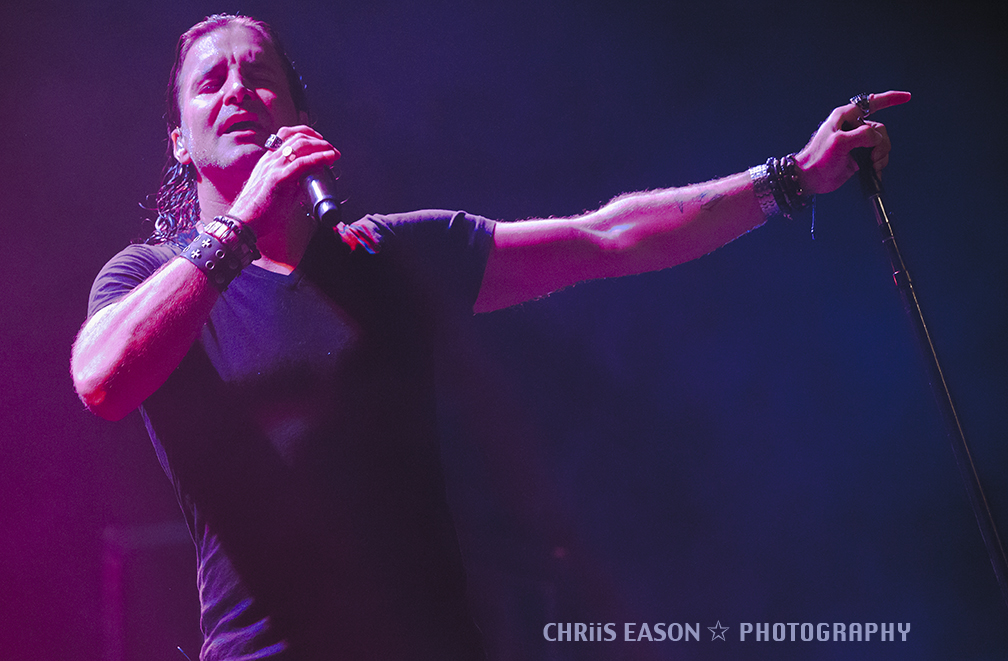
OTM: In your book, you talked about the complexity of rock and roll, then go on to talk about how you and Mark Tremonti wrote the framework for Weathered on the deck of your yacht for three weeks. You let everyone know you lived in a gated community near Disney World where you could watch fireworks coming from the park every night with your son. You give your mom and despised stepfather $1.5 million to get them out of debt. You go to Hawaii on a whim to cleanse your soul. You are married to a beautiful woman who is ‘all in with you’ despite your attempts to destroy your marriage. You attained the American dream, the very foundation this country was built upon. Your suicide attempts not once, but twice, after achieving that ‘dream’ are a smack in the face to all Americans who believe anything is possible with hard work and determination.
Mental illness and depression is a very twisted and sad situation. When you throw drugs and alcohol into the mix, nothing makes sense. Look at actor Phillip Seymour Hoffman who just died from an overdose of heroin. I would consider that a suicide. He was fully aware of his addiction, his issues, and everything you try to do to numb the pain of what’s eating away at you. You’re fully aware of the odds you could die by your actions. I also think too, that the one thing I learned is that no matter how much success you have, or how much money you’ve earned and things are going your way, it doesn’t bring true happiness or fulfillment. I had a deep hole in my soul and now I am fully aware of why.
OTM: Scott, what is sad here is the fact your legacy as a musician wasn’t harmed by those foolish attempts to take your life. It was probably enhanced.
Again, the stories of my suicide attempts are sort of overblown. The first time, I only thought about it for a split second but couldn’t bring myself to do it. The fall off the balcony at the Delano Hotel in Miami, that was not a suicide attempt but a drunken accident. I was really trying to climb over the balcony in order to get to the one below my room. It was totally stupid, I know that. So it wasn’t two suicide attempts. One I thought about for like a split second before coming to my senses; the other was a drunken accident. To the outside world, that statement sounds pretty confusing. You think that any artist that has achieved all those things – money, success, selling millions of records – how do you possibly end up in a dark, low place where you want to destroy it all. That’s the oxymoron of depression and mental illness.
OTM: You are extremely lucky you didn’t join the ’27 Club’, you know that.
Every day I’m alive I’m thankful to be here on earth. Honestly, I think those issues I dealt with are something our society is dealing with on a regular basis. People are doing all sorts of crazy things when they are mentally sick. I am thankful to God I found a way out. I’m aware of the dangers that are still there and took the steps to correct the problems. I’m not sick anymore, but it sure did destroy ten years of my life and ruined everything I worked so hard to achieve in becoming an artist. I am very thankful I was able to find a way out of that destructive path I was on. My faith in Christ pulled me out of that gutter. It has enabled me to keep a wonderful wife, be blessed with three beautiful children, and most of all be given another opportunity to make music, which is something I truly love.
OTM: I was reading the lyrics to songs you posted in the back of your book. In all honesty, you are one of the smartest wordsmiths I’ve ever read. You don’t cuss, you don’t denigrate, you just write about your observations on life which fans really connected with. I’m surprised you weren’t able to ‘write out your pain’ when hell was breaking loose around you.
I did, but the challenge, what perpetuated things, it just was not fully understand what was going on with me. I compounded my problem by using alcohol and drugs to self-medicate and get through life. Those things have tremendous negative side-effects and consequences. Once you throw that into the equation, the healthy way of dealing with that emotional pain and illness, for me, was to act out in a physical way. When you always feel like you have been hit by a Mack truck and you can’t figure out why, you do whatever you can to survive. And thank God I did. Now that I look on the other side of it, I deal with the trying times in my life in a healthy way. I am very thankful that I have music as a way to work through it. The down cycle for me started in Creed with the mentality that the show must go on, thus I would do anything to perk myself up. Music and writing is very therapeutic for me. Today, I work with young people that have been involved in some very horrible childhood circumstances.
OTM: On your new album, you gave credit to 15 other songwriters. Isn’t it hard to explore your inner thoughts and feelings when you have so many different people trying to interpret what you are going through?
That’s a good question. I love jamming with various artists. It inspires me, it sharpens my skills. How I dealt with these songwriters creating a musical bed – in terms of melodies, lyrics and song structure – that all comes from me after the fact. I really enjoyed getting together with different artists and writing freestyle. It helped me take the focus off what I was doing on guitar so I could be free to creatively express myself by exploring my stream of consciousness. That’s what these songwriting sessions actually were. I enjoyed the way they would take an initial musical idea and add their own twist, or even take the song in an entirely different direction. I was inspired melodically quite a bit by the twists and turns these guys came up with in during our jam sessions.
OTM: As you astutely observed in your book, the rapport and chemistry between a guitarist and the singer, when it is right, is something magical that can’t be explained. Did you and Mark both need to work on Full Circle to see if that chemistry still existed before either one of you could move on with your lives?
I don’t think that was the motive. Mark and I, we broke our teeth in writing songs together. The two of us know each other extremely well. We have well-defined lanes in our songwriting relationship. What I tried to do on my solo record was recreate what I know how to do best with what Mark and I did the first few years of Creed. The two of us would sit down with concepts, ideas and riffs. Once we agreed on the direction, he was free to play the music over and over again while I worked on lyrics and melodies. Mark and I can do that for the rest of our lives because we have that connection. I was able to recreate that situation with fifteen, sixteen other guys I wrote with on this new record of mine. It is exciting at this stage of my career to know that the same magic and chemistry that I had with Mark I share with a bunch of other guys. I hope to continue to add to that list in the future.
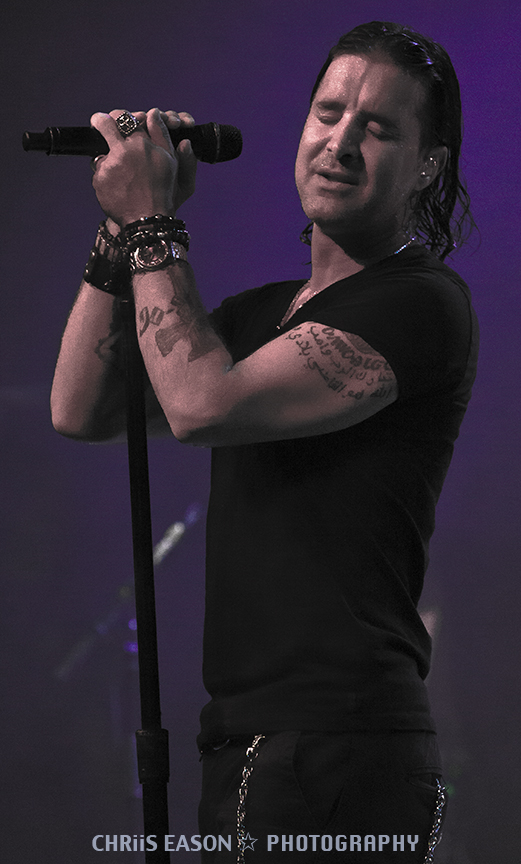
OTM: You said Proof of Life was the most honest record you had ever written. Does that mean everything you did in the past was a bunch of bullshit?
You are pretty funny. No, not at all! It was all honest and that was one thing I prided myself in. I once heard Bob Dylan in an interview say that the key to writing songs was to simply ‘tell the truth.’ That has been my approach since Day One. To clarify that remark, this album is more concise and to the point. There is less metaphor, analogy, less allegory, less poetry although it’s still there. It is as straight forward for me as I can make it without painting pictures around specific feelings. From that standpoint, I would say Proof of Life is the most clearly articulate of all the complete honest records that I have ever done.
OTM: Without the pain and suffering you grew up with, do you think you would have turned out to be the thoughtful, and in some cases, insightful lyricist you became. I applaud you for turning tragedy into triumph. Does your tattered past still fuel you today?
Absolutely! Sometimes in my head, I still hear words that were directed at me as a child, like you’re never going to amount to anything or you’re never going to be able to do anything without me. I think that’s all part of my DNA. It left me with a lifelong chip on my shoulder to try and prove that I am not what I was told as a child. I know how I was treated in the past has had a tremendous impact on my motivation.
OTM: In the acknowledgments of your book, you don’t mention you’re the names of your mother nor your sisters Amie, Amanda, or your stepfather, whose name you took. Why?
They have not been a part of my life the last ten years.
OTM: That’s a shame.
It’s tragic, but I have three children of my own. In order to break certain generational curses and to keep certain toxicity away from these three little lives I have, I’m not going to allow my children to be exposed to the sickness I went through. I’m not ever going to put them in situations where their safety, health and physical well-being are in jeopardy. I’m also not going to have them hang around people with substance abuse issues and other things like that. Trust me, I did as much as I could for my family to lovingly help and invite them to be a part of my life – again. Before I got married, I invited them to my wedding, but they chose not to be a part of it. Then again in 2007, I invited them down to sort of get a litmus test of where they were, if things had changed. There are certain things I’ll never be able to trust my father with without going into too many details, and mainly it’s my little girl. We don’t have to go any further than that.
OTM: I can read between the lines.
There was a lot that went on that I wasn’t prepared to share at this stage of my life in this book about certain abuse. Hopefully that will clear up, but until I’m convinced it has, I have made a decision not to expose my children to any of that.
OTM: Every garage band that gets together and starts jamming dreams of one day attaining money, glory, power and fame with their music. It’s safe to say 99 percent will never attain those goals. Creed however, defied the odds. Instead of relishing the success, it tore you all apart. Did you ever figure out why?
Yeah, I know why. I think with the details of that, and out of respect for those guys, I have to keep that to myself. One of the main reasons, one of the main divisive reasons that ended Creed, is there was one person that was never really content with his role in the band. It was never articulated, and the way it was handled was not good at all. Hopefully you can take what you will from that, but you can’t have a group when there is a derisive member seeking to basically replace you. It’s impossible to have a band when there is someone waiting in the wings to capitalize off any failing you have for their own agenda and goals.
OTM: Rock and roll is not logical it is emotional, as you well know. Emotions, good or bad, will continuously haunt you if you let it. You finally write and release a new Creed album in 2009 after eight years and tour behind it. Then in 2012 you all decide to tour and perform either My Own Prison or Human Clay in its entirety finishing up with four cuts from Weathered. Have you finally purged the past from your system and NOW, with this solo album you have out, finally moving forward with no regrets whatsoever.
Absolutely! I think for a long time, as far as regret goes, I’m very hard on myself. I have been my entire life. I let regret and things that were my fault, and things that weren’t my fault, eat me up for years. I think that writing my book and then this record, I closed the door on that chapter, on that time in my life, and I am so glad. My life is really summed up in the final chapter of my book. Those days are gone. I’ve said this before, the messes I’ve made in my life was part of something that I was able to turn into a message on this record. I was able, through God’s help and a lot of work on myself as a human being, to take certain things and repurpose them. By doing that, I found a new reason for living. By giving myself in service to others, I found Scott Stapp. This record here is the first step for me. We’ll see where the road takes me from here.
OTM: Why did you get tattoos? Was that the final transformation you need to complete YOU?
No, I get tattoos to mark memorable things I don’t ever want to forget in my life. Various people have reasons why they get tattoos, but to me, they are a bio on my body of things I don’t want to forget, that mean a lot to me.
OTM: You’re still with Wind-Up despite the fact Creed was screwed out of millions of dollars in royalties. You even alluded to it in your book when you asked Alan about it. Why are you still with the label?
Well, it’s about my contract. Alan (Meltzer) passed away in 2011, and with his passing a lot of changes of the guard happened. A lot of our ability to make those wrongs against Creed right passed with him. I had a meeting with the new powers at Wind Up and they were committed to making this record. They were behind me and were a part of being victimized by the former owners as well. So we decided to wipe the slate clean. I am happy with them there. They have stuck by me a lot. This is my last contractual album, so we will see what happens in the future.
OTM: One of the great lines of your book was “Playing music is the promise of an unknown future.” That’s a brilliant observation all musicians can definitely relate to.
Thank you.
OTM: There’s nothing more a journalist hates to do than defend their own questions. I am surprised that when the quote ‘Christian Rumors’ started circulating about Creed, you didn’t fight back. All you had to do was ask the writers if they had a problem with God. You would have stopped them dead in their tracks.
That’s a good question. I don’t know. I was in my early 20’s, everything was happening really fast for us. I had gone from a one bedroom apartment I was sharing with three guys, just $600 in my bank account to like overnight having the world at my fingertips. I wasn’t experienced with the press. Seriously, I was flying by the seat of my pants. Today, you ask a great question. “Why didn’t I fight back?” I think part of it was I felt so uncomfortable every time the band was asked about Christianity or our faith, because the three guys in my band hated me for it. They felt like, “What has he done to us? He is ruining our rock and roll dreams!” I felt the internal tension about that. I circumvented and started shooting from the hip to preserve the relationships within the band. At that particular point when this was going down, I wasn’t living like a Christian and Creed wasn’t a Christian band. I was dealing with things through my lyrics, but the band didn’t have any idea. They never took any interest in what I was writing about or anything like that. There were a lot of different factors that clouded my mind, dulling my instincts to address the questions that were being posed to me at the time. It is a great question though.
OTM: You know Scott, when your first two albums sell 16 million copies in the U.S. alone, it doesn’t matter how you personally think, feel or even what you believe in. It’s not anyone’s business. It’s quite obvious the songs are speaking to people the world over. That’s why the attacks on Creed made no sense to me at the time.
Really? Why is that?
OTM: Your lyrics communicated something very special to people they readily identified with. In turn, they bought your albums by the millions because your music spoke to them. Critics are a dime a dozen, yet Creed let this extremely small cadre of people affect the band while ignoring the voices of millions who were supporting you by purchasing your music and going to see you in concert.
You may not understand it David, but believe it or not, I do. I do understand the backlash because of the things I was talking about, the feelings I was expressing, they were something millions and millions of people shared and thought about, but had never heard them expressed that way in song. I was communicating more to what the masses thought and felt than the critics themselves wanted to think. And it really bothered them. Who knows, maybe it still does to this day.
